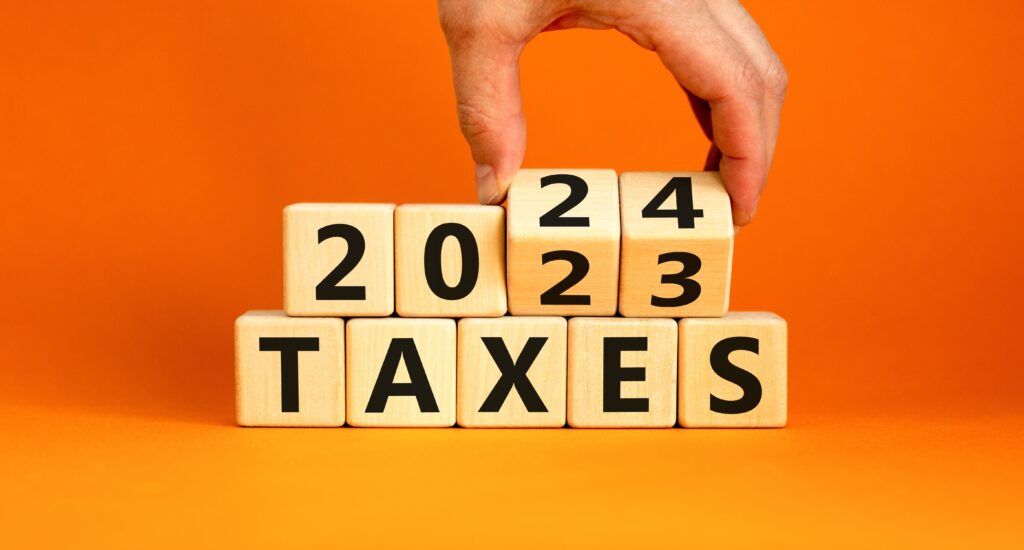Brittany Falkner
Wealth Manager
As the saying goes, nothing in this life is certain besides death and taxes. My version would be edited to include AND tax law updates! This year is no exception. Many of 2024’s changes were enacted through various pieces of prior legislation including the Secure Act 1.0 and Secure Act 2.0. Below, I’ll review a few of the changes that definitely caught my eye. I’ve also included a chart of a few important numbers to know.
Inherited IRA accounts may be subject to Required Minimum Distributions (RMDs) this year!
What: After years of uncertainty, this is the first year that the IRS is requiring non-eligible beneficiaries who inherited an IRA account after December 2019 to possibly be subject to RMDS. If the original account owner was subject to RMDs before their death, you as the heir may be required to take annual RMDs along with the requirement to empty the account within 10 years after inheriting. I recommend discussing this complicated matter further with your financial professionals as it has many moving parts.
Why you should care: The penalty for not taking a RMD is 25%!
Updates to the clean energy tax credit for electric cars.
What: The Clean Energy Tax Credit has been updated so electric cars with an MRSP of less than $55,000 and Vans/SUVS of less than $80,000 are now eligible. This removes the manufacturing limitations previously in place making GM, Toyota, and Tesla EVs eligible. However, there is a new income limitation to claim the credit of $300,000 MFJ (and $150,000 Single). New to 2024, you may transfer your tax credit to the dealer to receive an immediate price reduction rather than waiting to file your tax return.
Why you should care: You may get an immediate $7,500 off the purchase price from the dealer, but if your income is too high you are required to repay this on your tax return!
Updates to the energy efficient home improvement tax credit.
What: Updates to your home that are energy efficient such as central air conditioners, water heaters, furnaces and water boilers allow a credit of 30% of costs up to $600 for each item, with a yearly limit of $1,200 for this category.
Why you should care: This credit had a previous $500 lifetime maximum which is now completely reset. This means you can now be eligible for this tax credit again each year. Happy shopping!
You may be able to roll left over 529 account dollars to a Roth IRA.
What: If you have excess funds left over in a 529 college savings account, you may be able to roll these dollars into a Roth IRA account tax free for the named beneficiary. There are several rules surrounding this including: the account must have been open for at least 15 years, the beneficiary must have earned income to be eligible to make an IRA contribution in that year, the annual rollover amount is limited to the maximum Roth IRA contribution for that year, contributions & earnings must have been contributed more than 5 years ago to be rolled over, and there is a lifetime maximum of $35,000 per beneficiary. There are still many questions on this that we expect the IRS to clarify, mainly: does updating beneficiaries of the 529 reset the 15-year clock?
Why you should care: The income limitations of Roth IRA contributions do not apply to this transfer meaning high earning individuals listed as a beneficiary of a 529 would be eligible!
Catch up contributions made to employer retirement accounts are required to be made as Roth contributions for high earners beginning in 2026.
What: Defined contribution retirement plans are permitted to allow participants over the age of 50 or older to make additional “catch-up” contributions to their accounts ($7,500 in 2024). Currently these catch-up provisions are allowed to be made on a pre-tax basis. Starting in 2026, individuals who earn over $145,000 will be required to make these catch-up contributions as Roth contributions.
Why you should care: This change was originally set to begin in 2024 but is now being pushed back to 2026. When this does take effect, it will remove the tax savings of the additional pre-tax contributions made and therefore you may owe additional taxes if this applies to you.
Penalty free emergency withdrawals allowed from employer retirement accounts.
What: The Secure Act 2.0 allows IRA owners and retirement plan participants to process an “emergency personal expense distribution” up to $1,000 with no 10% penalty if under age 59.5. You are allowed to repay these distributions over a three-year period if you self-certify you had an unforeseeable or immediate financial need relating to a personal or family expense.
Why you should care: This may be a way to tap into your employer account to fulfill an unexpected expense instead of using a credit card or loan.
A new retirement savings lost and found website!
What: The Secure Act 2.0 directs the Department of Labor to create an online searchable database for individuals and their beneficiaries to locate missing employer benefits/accounts by 12/29/2024. More details to come.
Why you should care: This will allow all individuals to search for lost retirement accounts and hopefully recover those dollars!
Numbers to Know:
| 2024 | 2023 | |
| IRA and Roth IRA Contribution Limits | $7,000 ($8,000 for ages 50+) | $6,500 ($7,500 for ages 50+) |
| 401(k), 403(b), 457 Contribution Limit | $23,000 ($30,500 for ages 50+) | $22,500 ($30,000 for ages 50+) |
| Health Savings Account Maximum Contributions | $4,150 Single $8,300 Family (extra $1,000 for ages 55+) | $3,850 Single $7,750 Family (extra $1,000 for ages 55+) |
| Flexible Spending Account | $3,200 | $3,050 |
| Annual Gifting Limit | $18,000 | $17,000 |
| Social Security Cost of Living Adjustment | 3.2% | 8.7% |
| Required Minimum Distribution Age | Age 73 for those born on or after January 1, 1951 Age 75 for those born after 1960 | 72 |
The above is a quick highlight of a few of the changes taking place in 2024. If you have any questions on the 2024 tax laws or your specific tax situation, please reach out to your Boardwalk advisor.











